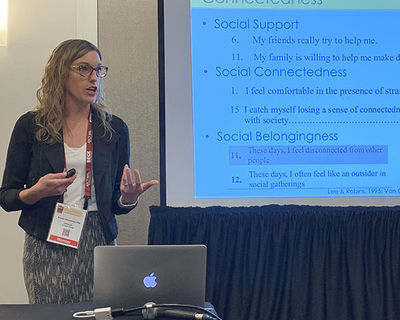
This Q&A is part of an ongoing series with Arts and Letters faculty. Read more Q&As with faculty members and graduate students here.
Brooke Ammerman, an assistant professor of psychology, came to Notre Dame in 2018, after receiving a Ph.D. in clinical psychology from Temple University. She is director of the Affect, Suicide, Self-Injury, and Social Triggers (ASSIST) Lab, which focuses on understanding and improving risk prediction for self-injurious thoughts and behaviors, with a particular focus on how interpersonal contexts can serve as risk and protective factors, particularly for individuals at unique heightened risk.
What inspired you to study self-injurious thoughts and behaviors?
My interest in studying self-injurious thoughts and behaviors initially spurred out of exposure to the concepts in the classroom. But, thereafter, it was largely driven by working directly with individuals struggling with these experiences while I was in college. After becoming more aware of our limited understanding of the factors influencing their occurrence, I wanted the opportunity to contribute to the field.
What are you currently researching?
My current research aims to improve the identification of acute, or proximal, risk factors for self-injurious thoughts and behaviors, such as nonsuicidal self-injury, suicidal thinking, and suicide attempts. One of the specific areas we are focusing on is how interpersonal stress or conflict may be a unique risk factor for self-injurious thoughts and behaviors, versus other risky behaviors like substance use. We hope that by improving our understanding of these “short-term” factors that elevate one’s risk, this information can be translated into improving our prevention and intervention efforts.
“Both undergraduate and graduate students are involved in my lab. They are essential not only to the day-to-day aspects of research — running participants, preparing studies for data collection, etc. — but their viewpoint about our area of study has been incredibly valuable.”
Why is it crucial that we better understand the risk factors and protective factors for these behaviors?
Improving our understanding of self-injurious thoughts and behaviors is crucial to ensuring that we are able to develop the most effective intervention efforts for those struggling with these experiences. But it is also essential for developing prevention efforts that aim to reduce the onset of these behaviors, particularly among those at highest risk.
How do you bring your research into the classroom?
Since one of my primary courses is Experimental Psychology II: Methods, I use my research as one of many examples from different areas of psychology of how research has the potential to make broader impacts on individual lives, thus emphasizing the importance of all students, regardless of long-term career goals, becoming familiar with the research process.

Cognitive Therapies conference
How are undergraduate and graduate students involved in the lab — and how valuable are they to your research process?
Both undergraduate and graduate students are involved in my lab. They are essential not only to the day-to-day aspects of research — running participants, preparing studies for data collection, etc. — but their viewpoint about our area of study has been incredibly valuable. Through their involvement, I believe that I am exposed to unique perspectives that have allowed the focus of my research to expand in a meaningful way.
Why is Notre Dame’s College of Arts and Letters the right place to be doing this work?
Notre Dame’s College of Arts and Letters is an excellent place to be conducting this research given that the University’s mission speaks to the desire to improve the well-being of those around us. I believe the lab’s work directly maps onto this mission as our long-term goal is to utilize the information gained through the research process to develop and disseminate prevention and intervention efforts that will ultimately serve to reduce suffering.
“Notre Dame’s College of Arts and Letters is an excellent place to be conducting this research given that the University’s mission speaks to the desire to improve the well-being of those around us. I believe the lab’s work directly maps onto this mission.”


